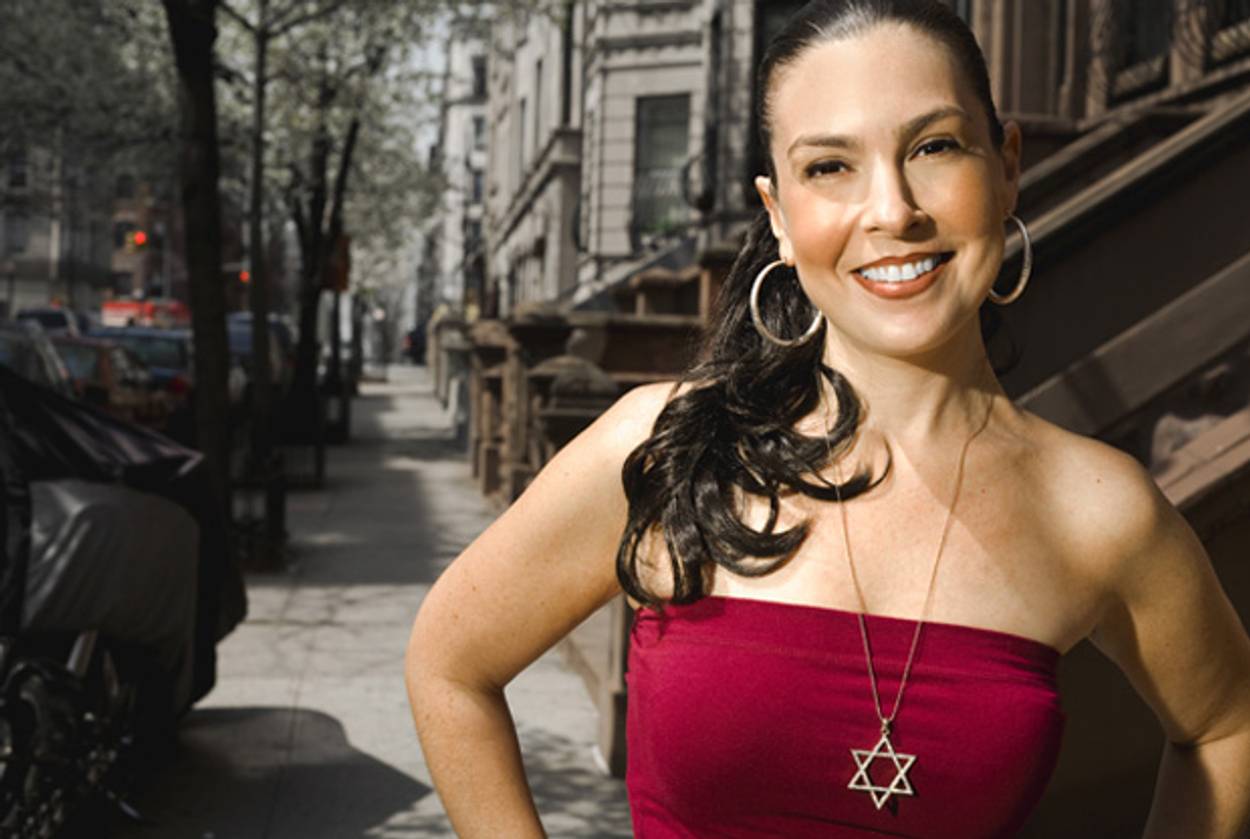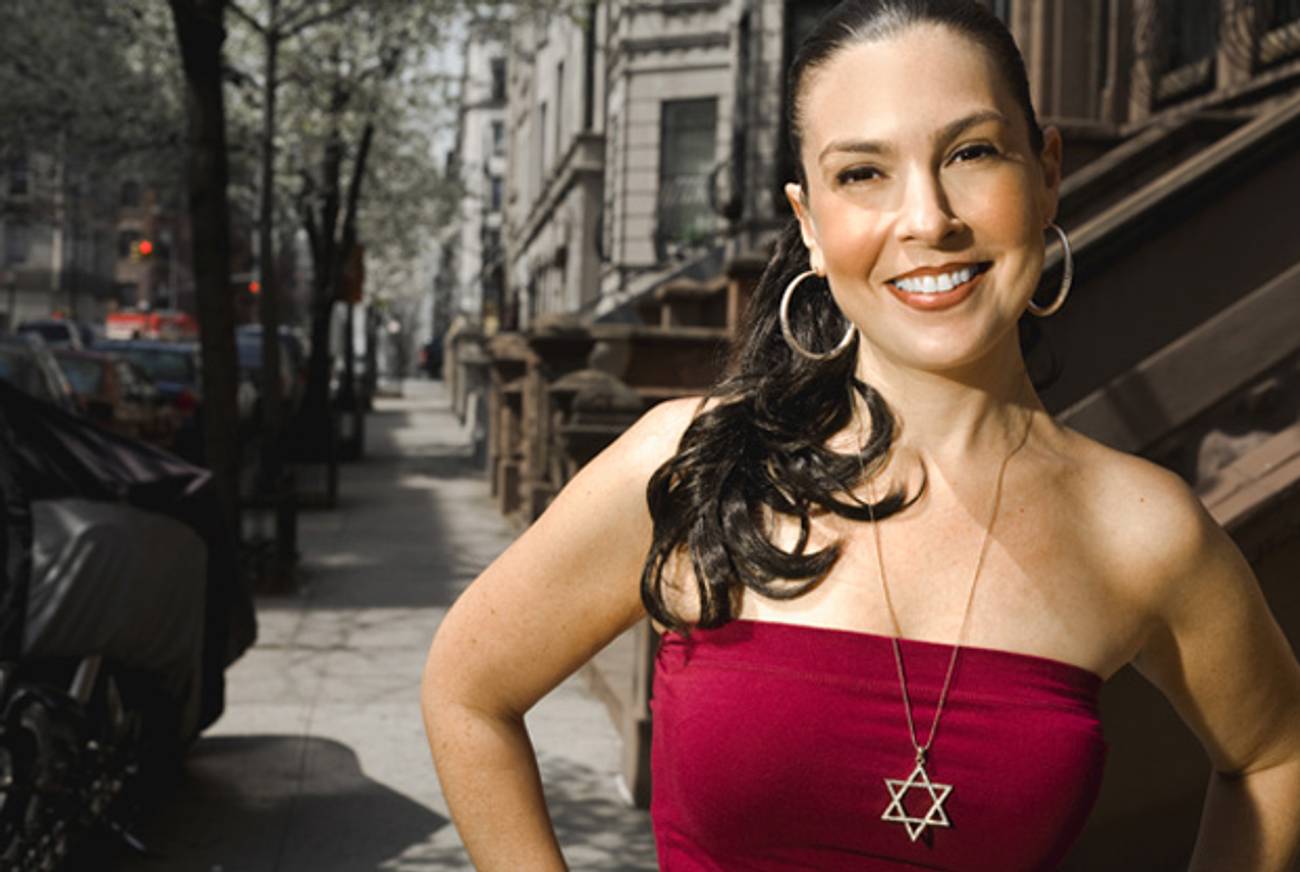Passing
Performer and poet Vanessa Hidary, the Hebrew mamita, mashes up her Jewish identity with that of a Puerto Rican—and unsettles stereotypes




“Another jewy piece by that jewish girl/ in the poetry scene who keeps/ being all jewy, talking about being jewish, writing/ about being jewish …/ jew, jew, jew, jew, jew,” is the battle cry of Vanessa Hidary, the Hebrew mamita. She is a slam poet known for her curves and for dressing like a Puerto Rican; big hoop earrings, tight jeans, hair pulled tightly back in a glistening high ponytail, great red lipstick, high heels. When I met her in New York at her favorite haunt, Starbucks, I admired her playful nom de plume, Hebrew mamita, for its mix of high-brow and low-brow culture, the former being the ancient language of Israel, the latter being the catcall that most self-respecting Puerto Rican girls cannot live without. (I am from Puerto Rico and know the catcall well: Though we hate being harassed, we also hate not being whistled at. And Jewish men do not whistle at women with curves or at all, for that matter.) Alas, Hidary has not one ounce of Puerto Rican blood in her. Does it matter?
The Last Kaiser Roll in the Bodega, Hidary’s 2011 collection of poetry, essays, and childhood memoirs, explores the gravitational pull of the two seemingly opposing forces that have shaped her sensibility on and off the poetry scene: the Jewish and Puerto Rican, the Kaiser roll and the bodega, salud and l’chaim, Rosh Hashanah and the Puerto Rican Day Parade, Holocaust survivors and hip-hop. It also describes how it is that a good Jewish girl became a badass slam poet who started performing and competing in what has been a historically male-dominated venue.
After receiving her MFA in theater from Trinity Rep Conservatory at Brown, Hidary wrote her first solo show, Culture Bandit, in 2000 and later performed it at the venerable Nuyorican Poets Café. What, one wonders, would the founders of the crown jewel of Puerto Rican poetry in Manhattan, Miguel Algarín and Miguel Piñero, think of her usurpation of Puerto Rican identity? In the ’70s, when the café was founded, it was a radical locus for expressing the Puerto Rican experience of discrimination, poverty, white oppression, and cultural angst in New York City. Ethnic cross-dressing would not have been appreciated.
Apparently this is still true today. Hidary has been called a race traitor and has been accused of stealing from Puerto Rican culture, specifically for the catcall mamita (which is also a term of affection). Puerto Rican-ness functions as a metaphor for the tensions between Ashkenazi and Sephardic culture contained in her own identity: Her maternal grandmother is from Aleppo, Syria, whereas her father’s mother is from Latvia. When I asked Hidary about her attraction to Latina identity and her playful yet powerful blurring of identity and cultures, she explained that her parents, progressive secular Jews, sent her to an experimental public school where Latinos, African Americans, and hip-hop predominated. She also went to Hebrew school. But she formed core bonds in her public school with Latino students, especially with a certain Letty Mangual. Hidary says she fell in love with the warmth of her family, their traditions, their food, and even Santa Claus. When I asked her why she felt the need to switch cultural worlds, she pointed to her body. She was a chubby girl growing up and she never felt like this fit within her Jewish community. Instead she found a home in the Puerto Rican body where curves are the norm and being “flaquita,” or super skinny, is most definitely not. And with that, her future identity as a cultural bandit was born.
The opening and closing poems in Hidary’s collection address the discomfort that both she and the curious bystander feel when trying to pin down her ethnicity: “What are you?/ Are you white?/ Are you Puerto Rican/ Are you Italian?/ oh, you’re all jewish?/ do you speak ‘jewish’?” Sometimes curiosity turns to an angry accusation: “Do you think you’re something you’re not?/ you know you’re jewish, right?/ … so if you’re not latina why the hell do you call/ yourself the Hebrew mamita?”
Racial and ethnic tensions are at the heart of Hidary’s work, and watching her perform (there are many YouTube videos of her performances) is like watching a cultural stealth bomber whose goal is to target warehouses of cultural stereotypes. She is a vibrant performer who gathers speed and explodes at the climax of her poems. She is the woman who is too independent, too hard to handle, who can’t relax when she should let things slide. She is the wild woman, the wise woman, the woman that makes men scared. She exploits our settled beliefs and fears about the boundaries of race and gender to generate discomfort, anger and laughter.
When I mention to her that some think we are in the post-race or post-post identity era she scoffs: “Not true.” Although these prejudices are perhaps no longer articulated as openly in our politically correct environment, they persist. Sometimes, Hidary said, because she is Jewish, others assume that she thinks and shares certain complicit and inherited perceptions of African Americans or Latinos. In turn, sometimes, because she “looks” Puerto Rican, people openly share anti-Semitism with her. Because Hidary can “pass” in both communities, she is a secret witness to flourishing underground racial tensions and prejudices. In her book she shares an alarming incident where a fan criticizes her for dating black men and labels her a self-hating Jew. He writes to her, “Vanessa, please do not tell me you date the schvartzes.” Her response is a moving poem; “dear, dear, yeshual,” she writes. “Sometimes the ones I refer to as my people/ are truly the most ignorant strangers to my soul.” And just recently, she said, she took a good friend up to the Bronx for a slam poetry event. While they were in the audience awaiting her friend’s turn, a Latino poet was on the stage. His poem devolved into a diatribe about how Jews control all the money. “It is still the most common and prevalent stereotype that I hear,” she said. “Jews are greedy, Jews are running the world.” When she hears this kind of stuff she always confronts the speaker.
Jews have plenty of lazy or stiff-necked prejudices of their own, especially when it comes to the hybrid identities that Hidary addresses in her work. As someone who frequently speaks to Jewish groups on questions of identity, she has found no shortage of exclusionary stereotypes directed against people whose identities seem unclear, the children of interfaith marriages. “I am in complete support of those who wish to date within the religion, but I don’t believe in turning away interfaith couples and converts,” she said. “I believe we can still have a strong Jewish community by opening up our doors to those who ‘marry out’ and have interfaith children. My work reflects this view, and I am sometimes not sure how it will be received.” Her heightened sense of awareness regarding stereotypes, negative and positive, forces her to constantly question ethnicities and our interpretation of them, and she is not afraid to call people out on their secret beliefs. “I’m something of a cultural policewoman,” she said. “I don’t go proselytizing all over town about it, but if I encounter prejudice I confront it.”
In the end, the collection is a confession of how Hidary switches tribes, how she is not culturally loyal to one ethnicity but to many. And why cultural dislocation is her milieu. She is a poser: “To be—or not to be—a poser,/ That is the question.” For if identity is a cultural construction, then la mamita hebrea de Siria is the perfect construct. And I, as a gringariqueña judía, am proud to recognize the importance of Hebrew mamitas.
Bridget Kevane is a professor of Latin American and Latino literature at Montana State University in Bozeman. Her work has appeared in the New York Times Book Review, ZEEK, the Forward, and Brain, Child, among other publications.
Bridget Kevane is a professor of Latin American and Latino literature at Montana State University in Bozeman. Her work has appeared in the New York Times Book Review, ZEEK, the Forward, and Brain, Child, among other publications.